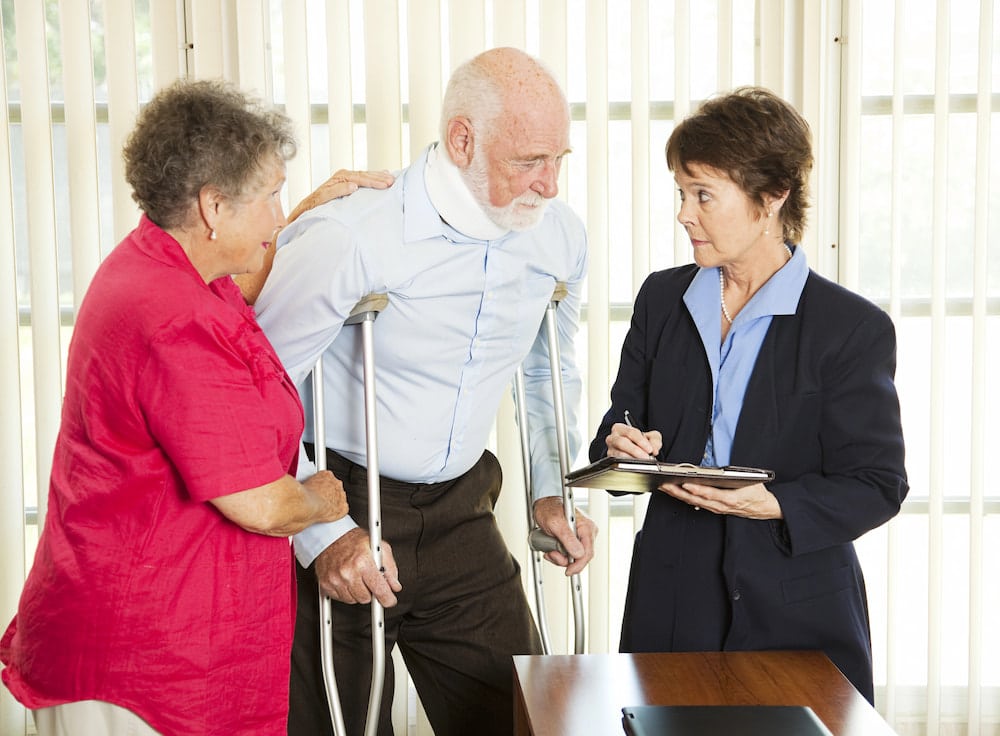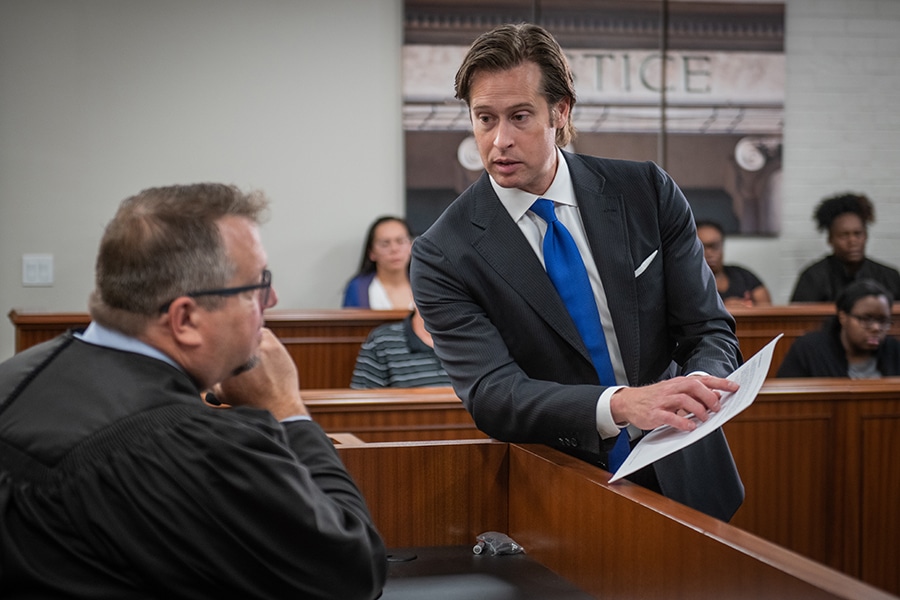Protecting Your Rights and Holding Negligent Parties Accountable
Personal injury law covers accidents and damages to your mind, body, or emotional state. You have a right to safety in public, and injuries that arise as a result of someone else’s negligence infringe on that right.
Business, landlords, property managers, and homeowners must make a reasonable effort to maintain a safe environment for all guests, customers, and patrons. Failure to do so could result in serious injury and even death. If you are injured on another person’s property, or sustain injuries that you feel are a direct result of someone’s negligence, you have the right to file a claim against the negligent party.
Winning your case, however, depends largely on proving negligence and establishing liability. This means proving that the property owner owed you a duty of care and failed in that duty. Retaining the services of an experienced Colorado Personal Injury Lawyer is critical during this process.

Why hire an attorney?
Personal injury lawsuits can be complex and often require intense investigation. Hiring an attorney with extensive knowledge of Colorado’s personal injury laws is the key to collecting the compensation you deserve. During the investigation, your attorney will need to establish that you were owed a duty of care that was failed by the liable party. As personal injury cases can be complex, it is important to have an experienced lawyer on your side from the start.

Why choose McDivitt Law Firm for your personal injury case?
McDivitt Law Firm will fight to get you the compensation that you deserve. Our expert team of Colorado personal injury lawyers now that winning a case starts with a complete and through investigation of the accident, the property where it occurred, and any factors that might have influenced it. We know that the evidence needed to win your case often depends on classification – and we work tirelessly to establish that a strict duty of care was owed to you.
Overview of personal injury
Under Colorado law, the duty of the property owner depends on whether you were a trespasser, a licensee, or an invitee at the time of your accident.
Invitees – Property owners owe the highest duty of care to invitees. Any patron or customer of a business is considered an invitee. Property owners must remediate all known hazards and take steps to prevent hazards as well.
Trespasser – Property owners owe no duty of care to a trespasser. They simply must avoid willfully or deliberately causing injury to a trespasser. An example of a trespasser is a thief or neighbor who is uninvited onto a property.
Licensee – Licensee’s, however, may recover damages if the homeowner knew about the dangerous condition and failed to fix the problem or warn guests of the problem. This is known as an intermediate standard of care. An example of a licensee is a guest at a house party.
Invitees – Property owners owe the highest duty of care to invitees. Any patron or customer of a business is considered an invitee. Property owners must remediate all known hazards and take steps to prevent hazards as well.
Types of personal injury
Slip and fall accident – According to the NFSI, more than one million people visit emergency rooms every year seeking treatment after a slip and fall accident. Slip and fall accidents can be particularly devastating for the elderly, who are more likely to suffer a fatality or serious injury.
Drownings in pools – Homeowners with a pool need to take steps to ensure the safety of children on their property. Installing a locking fence and gate around the pool is one way to reduce risk.
Inadequate security – Businesses have a responsibility to protect their guests from criminal assault and harm. Failing to install adequate lighting, security cameras, guards, or fences on the property can have dire consequences and property owners are responsible for the injuries their guests suffer as a result.
Restaurant liability – Restaurants owe their guests the highest duty of care. They can be held responsible for failing to consider food allergies, negligent security, dram shop violations, and other dangerous property conditions.
Amusement park accidents – Amusement parks have a high duty of care to their guests and must ensure the safety of all their rides, as well as proper maintenance of the grounds and park area.
Daycare injuries – When a daycare is negligent, serious accidents can occur to those children and infants. Failure to identify a choking hazard and inadequate supervision are two of the most common ways children can be injured at daycare.
Inadequate maintenance – Businesses that fail to maintain their property can be held liable for accidents and injuries that occur. From overgrown shrubbery to broken handrails, property owners and landlords that cut corners jeopardize everyone’s safety.
Hotel injury claims – Hotels can be held liable when guests suffer an injury on their property. Broken furniture, wet slippery surfaces, hazardous pool conditions, food poisoning, and bed bugs are all examples of negligence on hotel property.
Nightclub accidents – Like other property owners, nightclub owners have a responsibility to keep a safe environment for their guests. Employing bouncers to eliminate rowdy and aggressive patrons is one way that night clubs can keep their guests safe. Nightclub owners are also responsible for providing adequate security and not serving alcohol to visibly intoxicated guests.
Apartment complex accidents – Landlords have a duty to maintain their property and keep it free from hazards. Fixing broken gates, installing working locks, and repairing known hazards are vital to ensure the safety of their tenants. Landlords and property owners who know of hazards but who fail to fix them in a timely manner can be held responsible.
Pay Nothing Until McDivitt Wins For You.
Personal injury frequently asked questions
How can I file a personal injury lawsuit against a business?
To file a personal injury lawsuit, you must prove that the business or entity knew or reasonably should have known of the hazard that resulted in your injury. They must have known and failed to take reasonable action to reduce the risk to their customers. An experienced personal injury lawyer can help you determine if you have a case.
Can a college be held liable for an attack that happens on campus?
There are situations when a college, school, or university could be held liable for an assault or an attack on campus. Failure to provide adequate lighting on campus, failure to trim overgrown shrubs, and failure to provide adequate security can increase assaults and other criminal activity, leading to serious injuries to students.
Can I sue my neighbor if I was injured on her property?
If you were invited onto your neighbor’s property as a guest, and you sustained an injury while on their property, then you may be able to file a lawsuit to recover damages. Homeowners must tell their guests about any dangerous conditions that currently exist; however, simply being injured on their property is not enough to establish negligence. A personal injury attorney can review your accident and help determine if you have a case.
How long do I have to file a personal injury lawsuit?
In the state of Colorado, injured accident victims have two years from the date of the accident to file a claim against the negligent party. If you miss this deadline, you may be unable to collect the money you need to recover.
What damages am I entitled to recover in a personal injury case?
In a personal injury case, injured accident victims are able to recover damages for past and future medical expenses, long-term care, past and future loss of wages, pain and suffering, and emotional distress. In some cases, plaintiffs may be able to collect punitive damages.
How Can I Prove Negligence in My Personal Injury Case?
Proving negligence is the first goal in any personal injury case. To do so, you need to establish four key elements: duty of care, breach of duty, causation, and damages.
1. Duty of Care
Your attorney has to show that the defendant had a legal obligation to act a certain way toward you. For example, drivers must drive safely and follow traffic laws. If they didn’t carry out that duty, they may be responsible for your injury.
2. Breach of Duty
A breach is when the defendant fails to meet their duty of care. Let’s say someone runs a red light, causing a car crash—that would be a breach. Your attorney will have to prove that their actions were unreasonable.
3. Causation
Causation links the defendant’s breach of duty to your injury. You have to show that their actions directly caused your harm. This connection is what will prove that the defendant is responsible.
4. Damages
Finally, you’ll need to prove the damages caused by the breach of duty. These may include:
- Medical bills
- Lost wages
- Emotional distress
- Pain and suffering
Without damages, you won’t have a claim.
Evidence Used to Prove Negligence
Now that you know what you have to prove, here are a few types of evidence your lawyer might collect or ask you to provide to prove your case:
- Medical records: These show how serious your injuries are and verify the cost of your treatment.
- Accident reports: This piece of evidence includes details from law enforcement or first responders and can be used to prove who was at fault for the accident.
- Photographs: Photos of the location where you were injured can be used as evidence to prove negligence. Keep in mind that the photos should match up with the time that you were injured, as conditions can change over time.
- Witness statements: Statements from people who witnessed your injury can shed light on how the injury happened and who was at fault.
- Expert testimony: In some cases, experts can help explain the duty of care and how it was breached. For example, if you are charging a medical professional with negligence, another doctor can give expert testimony showing how you were treated improperly, causing harm.
Armed with these types of evidence, your personal injury attorney can show that you were failed by someone who owed you a duty of care. With that established, they can get to work coming up with an appropriate compensation amount.

Results and case studies
For over 50 years, the McDivitt Law Firm has helped injured victims throughout the state of Colorado obtain millions of dollars after catastrophic personal injury accidents. We believe in holding negligent landlords, property owners, homeowners, and businesses responsible for their actions. From the moment you call us, we begin investigating your accident and building your case. We work quickly and efficiently, so you can focus on your recovery. Check out what our past clients had to say about working with McDivitt Law Firm.
We’re here when you need us
Personal injury cases can be complex and difficult to navigate. Establishing negligence is key to obtaining the compensation you deserve and that starts with hiring an experienced Colorado personal injury lawyer immediately. Contact the McDivitt Law Firm attorneys in Denver, Colorado Springs, or Pueblo as early in the process as possible. We offer a free consultation and review of your case, so we can discuss all of your legal options.
